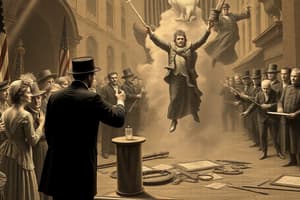Podcast
Questions and Answers
What was the Gilded Age and why was it called the Gilded Age?
What was the Gilded Age and why was it called the Gilded Age?
It was an era full of corruption in all parts of society. It was called the Gilded Age because of the social problems that could only be seen on the inside.
Who were the three parties during the Gilded Age?
Who were the three parties during the Gilded Age?
- Democrats (correct)
- Republicans (correct)
- Third Parties (correct)
- Independents
Neither party dominated during the Gilded Age.
Neither party dominated during the Gilded Age.
True (A)
What were some characteristics of Republicans during the Gilded Age?
What were some characteristics of Republicans during the Gilded Age?
What were some characteristics of Democrats during the Gilded Age?
What were some characteristics of Democrats during the Gilded Age?
What was the role of Third Parties during the Gilded Age?
What was the role of Third Parties during the Gilded Age?
What is 'The Machine' in the context of the Gilded Age?
What is 'The Machine' in the context of the Gilded Age?
What does 'straight ticket voting' mean?
What does 'straight ticket voting' mean?
What is the Spoils System?
What is the Spoils System?
What were the Republican factions during the Gilded Age?
What were the Republican factions during the Gilded Age?
What was Civil Service Reform?
What was Civil Service Reform?
Who was Rutherford Hayes and what was his view on the Spoils System?
Who was Rutherford Hayes and what was his view on the Spoils System?
What happened to James Garfield?
What happened to James Garfield?
What is the Pendleton Act?
What is the Pendleton Act?
Why did people immigrate to the United States during the Gilded Age?
Why did people immigrate to the United States during the Gilded Age?
What were the New Stock Immigrants characteristics?
What were the New Stock Immigrants characteristics?
What is urbanization?
What is urbanization?
What is the concept of 'Laissez Faire'?
What is the concept of 'Laissez Faire'?
What are monopolies?
What are monopolies?
What problems are associated with monopolies?
What problems are associated with monopolies?
What is Social Darwinism?
What is Social Darwinism?
Monopolies brought __________ to the economy.
Monopolies brought __________ to the economy.
What is the Gospel of Wealth?
What is the Gospel of Wealth?
Flashcards are hidden until you start studying
Study Notes
Gilded Age Overview
- An era marked by widespread corruption and inequality despite surface prosperity.
- Named "Gilded Age" due to social issues hidden beneath a facade of wealth.
Political Parties
- Major parties: Democrats, Republicans, and various Third Parties.
- None dominated the political landscape.
Republican Party Characteristics
- Advocated for government promotion of economic growth.
- Supported high tariffs to protect domestic industries.
- Believed in using government to enforce moral standards.
Democratic Party Characteristics
- Favored low tariffs and limited federal government intervention.
- Maintained views of white supremacy.
Third Parties
- Emerged to address issues often ignored by Republicans and Democrats.
Political Machines
- Organized groups that controlled local political parties, making key decisions.
Voting Practices
- Straight ticket voting allowed ballots to be cast for one specific party only.
Spoils System
- System of rewarding political supporters with government jobs; now illegal.
Republican Factions
- Division within the Republican Party: Stalwarts (led by Roscoe Conkling) and Half Breeds (led by James Blaine).
Civil Service Reform
- Movement aimed at curbing government corruption.
Key Figures
- Rutherford Hayes: 19th President opposed the spoils system but failed to enact reform.
- James Garfield: Unwilling president assassinated in 1881 over a disputed government job, spotlighting the spoil system.
- Chester Arthur: Garfield's VP, known for corruption.
Pendleton Act
- Legislation that abolished the spoils system.
Immigration
- Refers to permanent relocation of foreigners to the U.S.
Urbanization
- Defined as the growth and development of cities.
Importance of Immigration and Urbanization
- Fundamental changes in society's structure.
- Indicated increasing complexity in the U.S., causing anxiety among the middle class.
Immigration Patterns
- Occurred in significant waves.
- First wave: 1840s, primarily from Northern and Western Europe.
- Second wave: 1870s-1910s, known as New Stock Immigrants.
New Stock Immigrants
- Comprised largely of individuals from Southern and Eastern Europe, totaling around 50 million.
Reasons for Immigration
- Economic hardship, political and religious persecution prompted many to seek a better life in America.
- American policies encouraged immigration, with an appealing image of opportunity.
Urban Political Machines
- Small, powerful groups led by a “boss” that exploited city governance.
Business Characteristics
- Big business and labor unions struggled to resolve their opposing interests.
- Significant corporate growth contributed to rapid economic expansion.
- Labor unions signified widespread discontent among workers.
Laissez-Faire Economics
- Philosophy advocating minimal government intervention in business operations.
- Resulted in a lack of labor regulations.
Monopoly and Trust
- Situations in which a single company dominates an industry, limiting competition.
Robber Barons
- Influential industrialists who believed monopolies benefited the nation.
Impact of Monopolies
- Generally provided economic stability despite stifling innovation and consumer choices, while enabling price increases.
Social Darwinism
- The belief that only the strongest entities would survive in the economic landscape.
Gospel of Wealth
- The notion that successful companies should contribute back to society through philanthropy.
Problems Associated with Monopolies
- Discouraged innovation, limited consumer options, and caused price inflation.
Studying That Suits You
Use AI to generate personalized quizzes and flashcards to suit your learning preferences.




